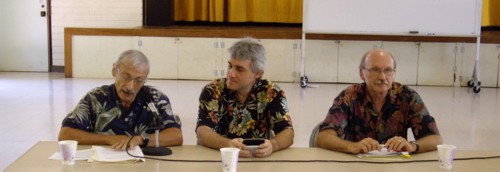September 22 Meeting: Con-Con, How YOU can make a difference

Click ![]() here to listen.
here to listen.
Panelists, left to right: Ira Rohter, Peter Kay, Jim Shon
“This was a really outstanding panel discussion….” T.J.Davies
Jim Shon: A “yes” vote in November for a Constitutional Convention, will require the legislature to decide: • How many delegates will there be and from how big a district. •What should they be paid to cover per diem, housing, airfare? How much can the delegate afford if there is no per diem? •Where will the convention be held, how much will that cost, can the public have easy access? • Should the delegates have an office and where? Same as where meeting are held? Cost? • When will the election of delegates be held- November or special election? When will the Con-Con be held? What kind of ballots, internet or mail in? What year? How to engage people to want to become delegates. •There must be research and public education prior to presenting recommendations to public for vote. Where? How? There are alternate models for a Con-Con: a Constitution Commission, the legislature can hold a mini con-con considering only 2-4 issues.
Ira Rohter: A Con-Con is an opportunity to decentralize power: home rule for counties, school districts, and housing. Now things can’t be done quickly. More people would be involved in decisions that affect them. Would like to have 102 delegates for a people’s convention that would be more participatory. Delegates should have reasonable salary, staff paid through public funding. Study groups should be organized immediately after the election and they should prepare white papers with plan A and plan B on how to carry out recommendations. Advise neighborhood workshops, town hall meetings for planning and candidate training. We need time to think through how we want government to be. How does it work? What do you want to change? The choice is to continue to complain or should we participate.
Peter Kay: The use of neighborhood boards and the internet are wonderful venues to disseminate information. It is a monster decentralized system, open to innovation because there is no regulation. His blog, hawaiiconcon.org is now asking “Do you think it is time for our citizens to overhaul the government?” The most popular topic on his blog is education. If Neighborhood Boards had decision making powers, they could be used more to make changes. The Internet could be used to educate public about recommendations before a vote. Going to meetings physically takes at least two hours away from busy people. There would be more involvement of citizens in the con-con process by using the Internet to take polls on the issues being discussed. Rolling polls would mirror what’s going on so delegates know what people are thinking. One caveat: Internet users don’t necessarily show up at the polls.
Comments: There is not any discussion in the media that is mostly concerned with the economic crisis and the presidential election. Rail is most local issue. There is no paper version of the Hawaii State Constitution available. It can only be viewed and printed out from the internet-all 47 pages. Groups “against” a Con-Con will be more vocal. Issues that can be considered: appointed BOE, initiative/referendum, county home rule, OHA, state workers unions.
 Kokua Council
Kokua Council

